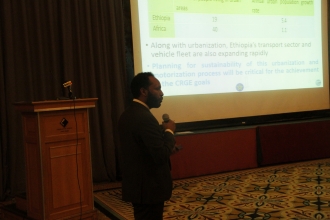Climate-Smart Agricultural Practices and Welfare of Rural Smallholders in Ethiopia: Does Planting Method Matter?
The purpose of this study is to provide empirical evidence on the impact of a climate-smart agricultural practice (row planting) on the welfare of rural households. Data collected from 260 households in the North Wollo Zone of Ethiopia were analyzed using Propensity Score Matching (PSM) and a semi-parametric Local Instrumental Variable (LIV) version of the generalized Roy model. The results from the PSM revealed that adoption of row planting technology has a positive and significant impact on per capita consumption and on crop income per hectare.
